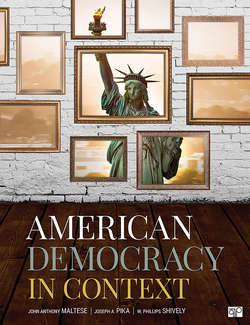Читать книгу American Democracy in Context - Joseph A. Pika - Страница 56
На сайте Литреса книга снята с продажи.
Civil War, the Glorious Revolution, and the English Bill of Rights
ОглавлениеIn 1642, 36 years after King James I had issued the first charters establishing American colonies, civil war erupted in England. James I (who ruled from 1602 to 1625) and his son and successor, Charles I, believed in the divine right of kings—that is, the idea that kings derived their right to rule from God and were not accountable to their subjects. They thus believed that they had absolute control over Parliament (the legislature in England) and could, for example, impose taxes without the consent of Parliament. Charles I took other unilateral steps as well, including arbitrary arrests and detentions, quartering troops in private homes, and even imposing martial law. He summoned and dissolved Parliament at will and claimed an absolute right to veto any legislation it passed. Increasingly angered, Parliament and its supporters waged a civil war against the king and his supporters.
In rising up against Charles I, Parliament invoked the Magna Carta and argued that the king was violating the rights of individuals. For example, opponents of the king argued that if he could tax without the consent of Parliament, then the English people and Parliament, their representative assembly, were in a state of servitude to the king. As we will see, concern about taxation without representation later became a key issue in the road to revolution in the American colonies.
The decades that followed were rocky times in England. Charles I was eventually beheaded. When his son, Charles II, tried to succeed him, another civil war ensued. Charles II fled to France, and Parliament declared England a “free state,” to be governed as a commonwealth without a king. That commonwealth lasted from 1651 until 1659. Charles II returned to England and was restored to the throne in 1660. King Charles II was now careful not to oppose Parliament, but his brother, James II, who succeeded him in 1685, tried to reassert the divine right of kings and to rule without Parliament. As a result, he was run out of the country in what became known as the Glorious Revolution of 1688.
The action of James II led Parliament to enact the English Bill of Rights, a statute that spelled out the basic rights of Englishmen and limited the power of future monarchs. Among other things, the Bill of Rights declared freedom from taxation by royal prerogative: Only Parliament, the representative of the people, could impose taxes. Together, the Magna Carta and the Bill of Rights were considered to be part of the country’s “unwritten” constitution, which came to be seen by British citizens as containing fundamental, inviolable principles.
